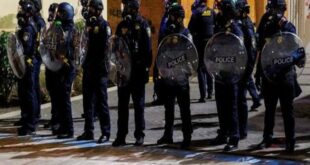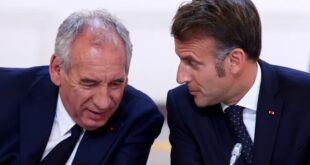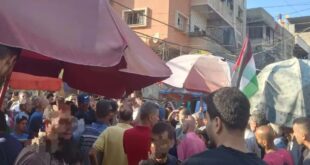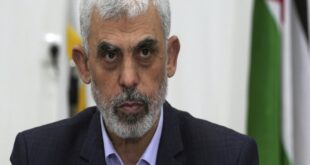
Provocation or preparation? And for what? The exact intentions informing the large-scale deployment of Russian forces close to Ukraine’s eastern border remain opaque. But it seems increasingly clear that the tensions stoked by Vladimir Putin in the spring – when a prior military build-up took place – were the initial phase of a new approach rather than a one-off performative episode. After five years of frozen conflict, a worrying thaw appears to be taking place.
In April, having marched tens of thousands of troops to the Ukrainian border, Mr Putin announced a partial pull-back, to the relief of Kyiv and the west. It has since emerged that the retreat was merely superficial; troops stayed in the region and many of the tanks, ballistic missiles and assorted artillery remain in place
. This hardware is now supplemented by an estimated 100,000 troops to the north, south and east of the Donbass region of Ukraine, controlled by pro-Russian separatists since 2014. Nato’s secretary general, Jens Stoltenberg, warned Moscow this week against “further provocation or aggressive actions” against an EU neighbour and ally. The US secretary of state, Antony Blinken, has said that any such aggression would be a “serious mistake”.
But Tuesday’s decision by the German energy regulator to temporarily suspend certification of the controversial Nord Stream 2 gas pipeline adds another unpredictable dimension to an unstable situation. The pipeline, which will allow Russia to bypass Ukraine when transporting energy to Germany, is seen by Kyiv as a threat to both its finances and security.
The military build-up on Ukraine’s eastern border signals a change in strategy from Moscow
US intelligence suggests a high probability of Russian military intervention. An outright invasion would constitute an enormous geopolitical risk for the Kremlin to take, as sanctions imposed in 2014 continue to bite hard. But it is evident that Mr Putin has decided that the time is right to substantially raise the temperature in the Donbass. The Ukrainian president, Volodymyr Zelensky, elected in 2019, has not proved as amenable to Russian influence and demands as anticipated, and Moscow has railed at treason charges brought against the pro-Russian politician and key Putin ally, Viktor Medvedchuk. The military build-up vastly enhances the Kremlin’s scope to convincingly sabre-rattle and react rapidly to alleged provocations.
Moscow’s suggestion that a recent drone attack in a separatist-controlled area could “destabilise the situation” is likely to be a taste of things to come. Having decided that moribund peace negotiations no longer serve its primary purpose of bullying Kyiv and obstructing its relationships with the EU and Nato, Moscow appears to be enacting a highly threatening plan B.
The military build-up thus represents a de facto escalation of a conflict that, while continuing to claim lives, has remained relatively static since the Minsk II agreement was signed in 2015. The west must make it clear to Moscow that upping the ante further will carry a substantial economic cost in the form of further sanctions and scupper the Nord Stream 2 project. From Bosnia to Belarus, Mr Putin’s baleful influence in the former Soviet sphere is deepening. Robust western solidarity with Kyiv will be needed to prevent a resurgence of the same in Ukraine this winter.





 World Opinions Débats De Société, Questions, Opinions et Tribunes.. La Voix Des Sans-Voix | Alternative Média
World Opinions Débats De Société, Questions, Opinions et Tribunes.. La Voix Des Sans-Voix | Alternative Média




